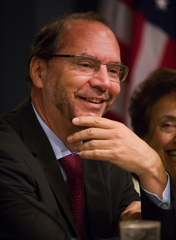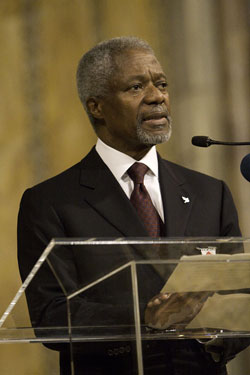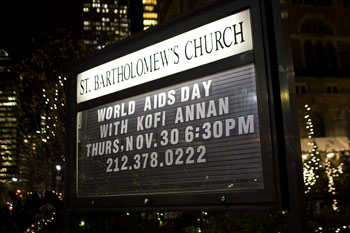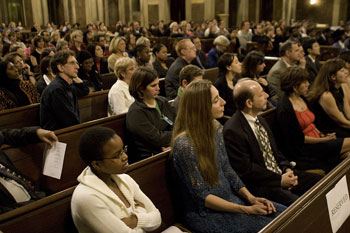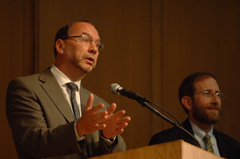 UNAIDS Executive Director Dr Peter Piot giving the
UNAIDS Executive Director Dr Peter Piot giving the
2007 Payne Lecture at Stanford University on May 9. “AIDS is forcing us to adopt new approaches, look at things differently, and transform the way we do things,” said UNAIDS Executive Director Peter Piot as he gave the 2007 Payne Lecture at Stanford University on May 9.
In remarks punctuated with statistics, Piot reflected on how the epidemic and its response have evolved and how AIDS is changing the world. He also outlined some of the key challenges ahead for sustaining the AIDS response in the long-term.
“We are still in the middle of a crisis. Eight thousand people are dying every single day from AIDS,” he said.
The UNAIDS Executive Director stressed that AIDS has turned into one of the most serious challenges our planet has ever faced, ranking with climate change, international terrorism, and the threat of nuclear war as “one of the defining issues of our time.”
He outlined how major progress has been made on many fronts, including decreasing rates of infection and increasing levels of antiretroviral medicine. And, he underlined, AIDS has become an agent for social change—for example, contributing to the gay rights movement by increasing awareness and leading to a healthy and more open consideration of sexuality and gender roles.
 Dr Piot outlined how major progress has been made
Dr Piot outlined how major progress has been made
on many fronts, including decreasing rates of
infection and increasing levels of antiretroviral
medicine.Nevertheless, he stressed, much remains to be done.
“The truth is that after 25, 26 years since AIDS was discovered, the end of this epidemic is nowhere in sight. AIDS is both a global problem and a multi-generational problem ,” he said.
“We need young people in the fight against AIDS because it is not going to be over tomorrow,” he added.
Roughly 65 million people have been infected with HIV since 1981. What started as a disease associated with middle-class gay men is now a universal problem.
“There are countries in southern Africa where 30-40% percent of the adults are HIV-positive,” Piot said. “Just imagine what that would be in California — 10, 20 million people living with HIV.”
Numbers like these are especially devastating countries with failing health systems, he said. He also noted that the epidemic is spreading alarmingly quickly in the former Soviet Union and India.
“ AIDS does to society what HIV does to the human body — it weakens the immune system just as it weakens the resiliency in a society,” he said. “It weakens the ability to cope and to deal with difficult things.”
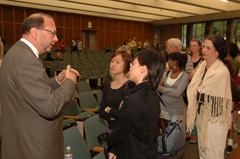 Dr Piot spoke of a “brilliant alliance” that would
Dr Piot spoke of a “brilliant alliance” that would
combine the efforts of politicians, big business, trade
unions and religious institutions to combat the
disease.He added that as an exceptional disease, AIDS requires an exceptional response and outlined a number of challenges ahead including increasing and sustaining political commitment and funding, ensuring the money available reaches the people who need it most, advancing scientific developments and addressing the fundamental drivers of the AIDS epidemic – such as gender inequality and violence against women, stigma and discrimination, and the marginalization of homosexuals, drug users, and migrants.
“There is enormous stigma and discrimination attached to the disease, and that’s what makes it so unique,” Piot said. “It’s about sex and drugs; that’s what makes it so difficult to address.”
Piot spoke of a “brilliant alliance” that would combine the efforts of politicians, big business, trade unions and religious institutions to combat the disease. “ We need the brightest and most creative minds to defeat this epidemic,” he said.
All photo credits: UNAIDS/R.Searcey




